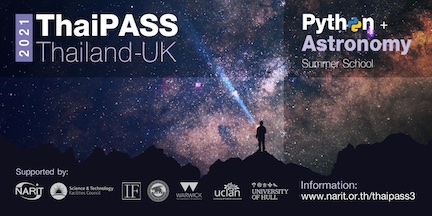NEW: ThaiPASS'21 is now an online summer school.
We are sad that ThaiPASS’21 cannot go ahead in Chiang Mai as planned. Instead, we are going to deliver ThaiPASS’21 online.
Here is the new schedule for ThaiPASS’21:
14th May 2021, 4-5PM: Introduction event on Zoom
(Download slides. Video recording on YouTube.)
This is a chance for everyone to get together on Zoom!
The UK team will introduce themselves. The organisers will also introduce participants from each school. All students and teachers are encouraged to attend to this event.
The Zoom link has been sent to your email. If you have not received the email, please email thaipass@narit.or.th
17th May 2021: YouTube videos released
The 3 UK universities will release video lectures on our YouTube channel on the topics as originally planned.
- Astronomy at High Speed (University of Warwick): Download slides
- The Lives of Stars (University of Hull): Download slides
- Exoplanets (University of Central Lancashire): Download slides
Students will be given 3 short programming homework submit (one homework to each UK university)
20th June 2021: Homework deadline
Each UK university will mark and return each of your homework.
If you pass, you will then receive a certificate with details of your achievements.
Note:
- If you did not pass the first time, you can try again!
- Students from the same school may work together and submit a single piece of homework.
Submit your homework by following the links here.
Brief descriptions of each session are as follows.
|
Astronomy at high speed: how to time stars |
We will learn the importance of timing in astronomy. Using real examples, we will study:
- How to measure the sizes of stars and planets from eclipse/transit timing
- Time systems in astronomy
- The use of timing to detect gravitational waves and third bodies
In the practical session, we will learn about data-reduction techniques, using real data from the Thai National Telescope (TNT). Students will then carry out an exercise based on a simple Python script to measure the times of eclipse features of an eclipsing binary. Students will also estimate stellar radii and orbital inclinations.
|
From birth to death: the lives of massive stars |
We will look at how stars live their lives and learn how each stage of their evolution is linked to fusion reactions which produce heavier and heavier elements. This ultimately will bring us to their violent deaths as supernova explosions, which return freshly created material back into space.
The activities will focus on both these aspects. The first part will focus on stellar models and data mining, using data provided by the NuGrid collaboration. Students will use simple Python scripts to investigate the structure and nucleosynthesis occurring in stars up until they collapse. The second part will then look at how supernova explosions occur. Students will analyse data from hydrodynamic simulations of explosions and compare the simulation data with analytic models.
From this session, students will learn basic data handling and visualisation, and come away with an appreciation of how stars contribute to the chemical make-up of the Universe.
|
Exoplanets: searching for new worlds |
We will introduce students to exoplanet-detection methods and discuss possible planet formation theories. The lectures will cover the following topics:
- Exoplanet detection methods (direct imaging, transits, radial velocities, gravitational microlensing)
- The properties of observed exoplanets
- What are the requirements for a planet to be habitable?
- Planet-formation theories
- Future prospects for exoplanet observations
The practical session will focus on downloading exoplanet transit data from the Kepler Mission database and use simple Python scripts to plot transit curves and to provide fits for these curves. The students will use these fits to determine the properties of a few exoplanets and find out whether these planets are in the habitable zone.
By the end of the course, teachers will have gained enough proficiency in Python to apply what they have learnt to their own academic fields. They would have taken the first important step in becoming Python trainers of students in their own schools.
|
Python for teachers |
In parallel to the main ThaiPASS activities for students, we will also run a 3-day course on Python for teachers. The course is tailored to secondary school teachers of STEM subjects. The Teachers will gain hands-on experience in Python programming aiming for developing teaching materials using animation. Topics will include, broadly:
- Python Programming for Teachers
- Visualization by Matplotlib
- Animation by Matplotlib and Tkinter
By the end of the course, teachers will have gained enough proficiency in Python to apply what they have learnt to creat simple animation for teaching materials. In addition, they would have taken the first important step in becoming Python trainers of students in their own schools.
All teachers' sessions will be conducted in Thai.

